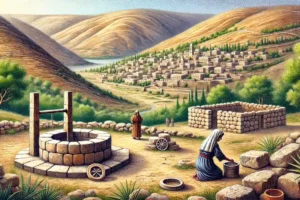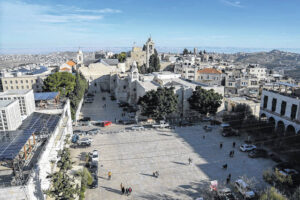
Rome: Biblical Significance and Early Christian Influence
Rome, the capital of the vast Roman Empire, holds significant importance in the biblical narrative. It was a major center of political power, culture, and early Christian activity. The city’s role in the New Testament is crucial, particularly concerning the Apostle Paul and the spread of Christianity. Here are some quick biblical facts about Rome:
- Rome in the Bible: Rome is mentioned several times in the New Testament. It was the capital of the Roman Empire and played a significant role in the spread of Christianity.
- Paul’s Imprisonment: The Apostle Paul was imprisoned in Rome. He wrote several of his epistles (letters) while under house arrest there, including Ephesians, Philippians, Colossians, and Philemon.
- Book of Acts: The Book of Acts ends with Paul in Rome, where he lived for two years, preaching the Gospel to both Jews and Gentiles (Acts 28:30-31).
- Christian Persecution: Rome was the site of significant persecution of Christians, particularly under emperors like Nero. Early Christians were often martyred in the city.
- Letter to the Romans: Paul wrote the Epistle to the Romans, a foundational theological document, to the Christian community in Rome. This letter outlines key doctrines of the Christian faith.
- Peter in Rome: According to tradition, the Apostle Peter also spent his final years in Rome and was martyred there. He is considered the first bishop of Rome and thus the first pope by the Roman Catholic Church.
- Roman Roads: The extensive network of Roman roads facilitated the spread of Christianity throughout the empire, including to and from Rome.
- Symbol of Babylon: In the Book of Revelation, Rome is symbolically referred to as “Babylon,” representing a center of worldly power and opposition to God (Revelation 17-18).
Introduction
Rome, the capital of the Roman Empire, is a significant city in biblical history, especially in the New Testament. Its political and cultural influence played a crucial role in shaping the early Christian church. The city’s involvement is seen through key figures like the Apostles Paul and Peter, and its infrastructure facilitated the rapid spread of Christianity. Here is a detailed analysis of Rome’s biblical significance.
Rome in the Bible
Rome is referenced several times in the New Testament, underscoring its importance in the early Christian era. The city was not just a political powerhouse but also a pivotal location for the spread of Christianity. As the capital of the Roman Empire, it was a hub where diverse cultures and religions intersected, creating an environment ripe for the propagation of new ideas, including the teachings of Jesus Christ.
Paul’s Imprisonment
The Apostle Paul’s connection to Rome is one of the most well-documented in the Bible. After his missionary journeys, Paul was arrested and eventually taken to Rome as a prisoner. While under house arrest, he continued to preach and write letters. These letters, known as epistles, include Ephesians, Philippians, Colossians, and Philemon. These texts are foundational to Christian doctrine, addressing theological issues, church organization, and Christian living.
The Book of Acts
The Book of Acts concludes with Paul’s time in Rome. After being shipwrecked and facing numerous trials, Paul arrives in Rome where he lives for two years. During this period, he preaches the Gospel boldly and without hindrance to both Jews and Gentiles. Acts 28:30-31 states, “Paul lived there two whole years at his own expense, and welcomed all who came to him, proclaiming the kingdom of God and teaching about the Lord Jesus Christ with all boldness and without hindrance.”
Christian Persecution
Rome was also a site of severe persecution of Christians, especially under Emperor Nero. Following the Great Fire of Rome in AD 64, Nero blamed Christians for the disaster, leading to widespread persecution. Early Christians were martyred in brutal ways, such as being thrown to wild beasts, crucified, or burned alive. This period of persecution is vividly recorded by Roman historians such as Tacitus and has a profound impact on the collective memory of the early church.
Letter to the Romans
Paul’s Epistle to the Romans is one of the most important theological documents in the New Testament. Written to the Christian community in Rome, it addresses fundamental doctrines such as justification by faith, the role of the Law, and God’s plan for Israel. Romans 1:16-17 captures the essence of the letter: “For I am not ashamed of the gospel, for it is the power of God for salvation to everyone who believes, to the Jew first and also to the Greek. For in it the righteousness of God is revealed from faith for faith, as it is written, ‘The righteous shall live by faith.’”
Peter in Rome
According to early Christian tradition, the Apostle Peter also spent his final years in Rome. He is believed to have been martyred during Nero’s persecution, crucified upside down at his own request, feeling unworthy to die in the same manner as Jesus. Peter’s presence in Rome and his martyrdom are significant for the Roman Catholic Church, which regards him as the first Pope, establishing the line of papal succession.
Roman Roads
The extensive network of Roman roads was crucial for the spread of Christianity. These roads connected the vast territories of the empire, allowing for relatively safe and efficient travel. This infrastructure enabled missionaries like Paul to travel widely and facilitated the movement of letters and other communications. The saying “All roads lead to Rome” underscores how central Rome was to the entire network, making it a strategic location for the dissemination of the Christian faith.
Symbol of Babylon
In the Book of Revelation, Rome is symbolically referred to as “Babylon.” This reference is found in Revelation 17-18, where Babylon is depicted as a city of great power and wealth, yet also of corruption and opposition to God. The use of Babylon as a symbol for Rome emphasizes its role as an earthly power in conflict with the divine. Revelation 17:5 describes it as “Babylon the great, mother of prostitutes and of earth’s abominations,” highlighting its perceived moral decadence.
Conclusion
Rome’s significance in biblical history cannot be overstated. As the epicenter of the Roman Empire, it was a place where key events in early Christianity unfolded, from the ministries of Paul and Peter to the writing of foundational texts and the persecution of believers. The city’s infrastructure and its depiction in biblical symbolism further underscore its pivotal role in the spread and development of Christianity. Understanding Rome’s place in the Bible helps illuminate the historical and cultural context in which early Christianity grew and thrived.



